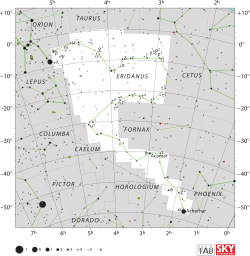Rho2 Eridani
Rho2 Eridani (ρ2 Eridani, förkortat Rho2 Eri, ρ2 Eri) som är stjärnans Bayerbeteckning, är en stjärna belägen i den nordvästra delen av stjärnbilden Eridanus. Den har en skenbar magnitud på 5,32[2], är svagt synlig för blotta ögat där ljusföroreningar ej förekommer och bildar en asterism med stjärnorna Rho1 och Rho3 Eridani, söder om Cetus. Baserat på parallaxmätning inom Hipparcosuppdraget på ca 12,3[1] mas, beräknas den befinna sig på ett avstånd på ca 260 ljusår (ca 81 parsek) från solen.
| Rho2 Eridani (ρ2) | |
 | |
| Observationsdata Epok: J2000.0 | |
|---|---|
| Stjärnbild | Eridanus |
| Rektascension | 03t 02m 42,28856s[1] |
| Deklination | -07° 41′ 07,7165″[1] |
| Skenbar magnitud () | +5,32[2] |
| Stjärntyp | |
| Spektraltyp | K0 III[3] |
| B–V | +0,94[2] |
| Astrometri | |
| Radialhastighet () | 26,38 ± 0,23[4] km/s |
| Egenrörelse (µ) | RA: +49,30[1] mas/år Dek.: -5,42[1] mas/år |
| Parallax () | 12,32 ± 1,23[1] |
| Avstånd | 260 ± 30 lå (81 ± 8 pc) |
| Absolut magnitud () | 0,830[5] |
| Detaljer | |
| Massa | 2,53[5] M☉ |
| Radie | 9[4] R☉ |
| Luminositet | 45,7[4] L☉ |
| Temperatur | 4 864[4] K |
| Metallicitet | 0,19[5] dex |
| Vinkelhastighet | 0,0[4] km/s |
| Andra beteckningar | |
| ρ2 Eridani, ρ2 Eri, 9 Eridani, BD-08° 568, HD 18953, HIP 14168, HR 917, SAO 130254.[6] | |
Egenskaper
redigeraRho2 Eridani är en orange till röd jättestjärna av spektralklass K0 III[3] och är en röd klumpjätte på den horisontella delen av Hertzsprung-Russell-diagrammet, vilket indikerar att den nu genererar energi genom fusion av helium i dess kärna.[5] Den har en massa som är ca 2,5[5] gånger större än solens massa, en radie som är ca 9[4] gånger större än solens och utsänder från dess fotosfär ca 46[4] gånger mera energi än solen vid en effektiv temperatur på ca 4 860[4] K.
Det finns en följeslagare av magnitud 9,7 separerad med 1,8 bågsekunder, som sannolikt bildar en dubbelstjärna med Rho2 Eridani.[7] Minst en av stjärnorna verkar vara en källa till röntgenstrålning[8] med ett strålningsflöde på 3,65 × 10-15 W/m2.[9]
Källor
redigera- Den här artikeln är helt eller delvis baserad på material från engelskspråkiga Wikipedia, tidigare version.
Referenser
redigera- ^ [a b c d e f] van Leeuwen, F. (2007), "Validation of the new Hipparcos reduction", Astronomy and Astrophysics, 474 (2): 653–664, arXiv:0708.1752 , Bibcode:2007A&A...474..653V, doi:10.1051/0004-6361:20078357.
- ^ [a b c] Johnson, H. L.; et al. (1966), "UBVRIJKL photometry of the bright stars", Communications of the Lunar and Planetary Laboratory, 4 (99), Bibcode:1966CoLPL...4...99J.
- ^ [a b] Houk, N.; Swift, C. (1999), "Michigan catalogue of two-dimensional spectral types for the HD Stars", Michigan Spectral Survey, 5, Bibcode:1999MSS...C05....0H.
- ^ [a b c d e f g h] Massarotti, Alessandro; et al. (January 2008), "Rotational and radial velocities for a sample of 761 HIPPARCOS giants and the role of binarity", The Astronomical Journal, 135 (1): 209–231, Bibcode:2008AJ....135..209M, doi:10.1088/0004-6256/135/1/209.
- ^ [a b c d e] Zhao, G.; et al. (2001), "High-Resolution Spectroscopic Observations of Hipparcos Red Clump Giants: Metallicity and Mass Determinations", The Astrophysical Journal, 551: L85, Bibcode:2001ApJ...551L..85Z, doi:10.1086/319832.
- ^ "rho02 Eri -- Double or multiple star", SIMBAD Astronomical Database, Centre de Données astronomiques de Strasbourg, hämtad 2016-10-12.
- ^ Eggleton, P. P.; Tokovinin, A. A. (September 2008), "A catalogue of multiplicity among bright stellar systems", Monthly Notices of the Royal Astronomical Society, 389 (2): 869–879, arXiv:0806.2878 , Bibcode:2008MNRAS.389..869E, doi:10.1111/j.1365-2966.2008.13596.x.
- ^ Haakonsen, Christian Bernt; Rutledge, Robert E. (September 2009), "XID II: Statistical Cross-Association of ROSAT Bright Source Catalog X-ray Sources with 2MASS Point Source Catalog Near-Infrared Sources", The Astrophysical Journal Supplement, 184 (1): 138–151, arXiv:0910.3229 , Bibcode:2009ApJS..184..138H, doi:10.1088/0067-0049/184/1/138.
- ^ Schwope, A.; et al. (2000), "The ROSAT Bright Survey: II. Catalogue of all high-galactic latitude RASS sources with PSPC countrate CR > 0.2 s−1", Astronomische Nachrichten, 321 (1): 1–52, arXiv:astro-ph/0003039 , Bibcode:2000AN....321....1S, doi:10.1002/(SICI)1521-3994(200003)321:1<1::AID-ASNA1>3.0.CO;2-C.



